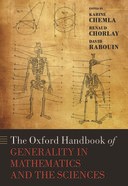 The Oxford Handbook of Generality in Mathematics and the Sciences
The Oxford Handbook of Generality in Mathematics and the Sciences
Contents
-
-
-
-
-
-
-
-
3.1 Introduction: “Everything is ruled by reason” 3.1 Introduction: “Everything is ruled by reason”
-
3.2 Generality and harmony 3.2 Generality and harmony
-
3.3 Generality and beauty 3.3 Generality and beauty
-
3.4 Generality and conciseness/simplicity 3.4 Generality and conciseness/simplicity
-
3.5 Generality and notation 3.5 Generality and notation
-
3.5.1 The notation for determinants 3.5.1 The notation for determinants
-
3.5.2 The products of power sums 3.5.2 The products of power sums
-
-
3.6 Generality and utility/fecundity 3.6 Generality and utility/fecundity
-
3.7 Generality and the laws of formation 3.7 Generality and the laws of formation
-
3.7.1 The general canon of division 3.7.1 The general canon of division
-
3.7.2 The determinants 3.7.2 The determinants
-
-
3.8 Epilogue: the order of the disciplines in view of their generality 3.8 Epilogue: the order of the disciplines in view of their generality
-
References References
-
-
-
-
-
-
-
-
-
-
-
3 Generality in Leibniz’s mathematics
Get accessEberhard Knobloch is Professor of History of Science and Technology at the Technische Universität Berlin (TUB)
-
Published:06 July 2017
Cite
Abstract
This article discusses generality in Gottfried Leibniz’s mathematics. In principle, Leibnizian mathematics has a philosophical-theological basis. From the beginning everything that exists is to be found in an orderly relation. The general and inviolable laws of the world are an ontological a priori. The universal harmony of the world consists in the largest possible variety being given the largest possible order so that the largest possible perfection is involved. After considering the relationship between the value of generality and the harmonies that are at the center of Leibniz’s concern, this article explores his view that generality implies beauty as well as conciseness and simplicity. It also examines how the interest in generality relates to notations, taking the examples of determinants and sums of powers, and to utility and fecundity. Finally, it demonstrates how generality is connected with laws of formation.
Sign in
Personal account
- Sign in with email/username & password
- Get email alerts
- Save searches
- Purchase content
- Activate your purchase/trial code
- Add your ORCID iD
Purchase
Our books are available by subscription or purchase to libraries and institutions.
Purchasing information| Month: | Total Views: |
|---|---|
| October 2022 | 1 |
| November 2022 | 2 |
| January 2023 | 2 |
| October 2023 | 3 |
| November 2023 | 2 |
| March 2024 | 2 |
| June 2024 | 2 |
| July 2024 | 2 |
| January 2025 | 1 |
| March 2025 | 4 |
Get help with access
Institutional access
Access to content on Oxford Academic is often provided through institutional subscriptions and purchases. If you are a member of an institution with an active account, you may be able to access content in one of the following ways:
IP based access
Typically, access is provided across an institutional network to a range of IP addresses. This authentication occurs automatically, and it is not possible to sign out of an IP authenticated account.
Sign in through your institution
Choose this option to get remote access when outside your institution. Shibboleth/Open Athens technology is used to provide single sign-on between your institution’s website and Oxford Academic.
If your institution is not listed or you cannot sign in to your institution’s website, please contact your librarian or administrator.
Sign in with a library card
Enter your library card number to sign in. If you cannot sign in, please contact your librarian.
Society Members
Society member access to a journal is achieved in one of the following ways:
Sign in through society site
Many societies offer single sign-on between the society website and Oxford Academic. If you see ‘Sign in through society site’ in the sign in pane within a journal:
If you do not have a society account or have forgotten your username or password, please contact your society.
Sign in using a personal account
Some societies use Oxford Academic personal accounts to provide access to their members. See below.
Personal account
A personal account can be used to get email alerts, save searches, purchase content, and activate subscriptions.
Some societies use Oxford Academic personal accounts to provide access to their members.
Viewing your signed in accounts
Click the account icon in the top right to:
Signed in but can't access content
Oxford Academic is home to a wide variety of products. The institutional subscription may not cover the content that you are trying to access. If you believe you should have access to that content, please contact your librarian.
Institutional account management
For librarians and administrators, your personal account also provides access to institutional account management. Here you will find options to view and activate subscriptions, manage institutional settings and access options, access usage statistics, and more.